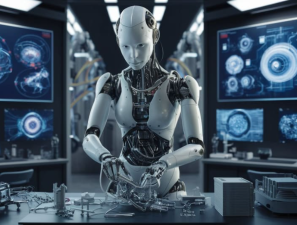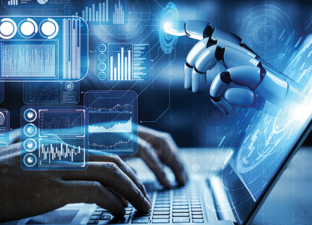The rapid development of artificial intelligence (AI) is profoundly reshaping the operating logic of human society. From medical diagnosis to climate prediction, from industrial production to artistic creation, the penetration of AI technology has long surpassed the tool attribute and has become the core driving force for the leap of human civilization to a higher dimension. Its research value is not only reflected in the breakthrough at the technical level, but also in the profound impact on human cognitive boundaries, social cooperation models and ethical frameworks.
The rapid development of artificial intelligence (AI) is profoundly reshaping the operating logic of human society. From medical diagnosis to climate prediction, from industrial production to artistic creation, the penetration of AI technology has long surpassed the tool attribute and has become the core driving force for the leap of human civilization to a higher dimension. Its research value is not only reflected in the breakthrough at the technical level, but also in the profound impact on human cognitive boundaries, social cooperation models and ethical frameworks.

Breaking through the technical ceiling:
Reshaping the scientific exploration paradigm
Traditional scientific research is limited by human cognitive ability and experimental costs, while AI is opening up a new exploration path:
-Complex system analysis capability:
In the field of protein structure prediction, AlphaFold can analyze the protein folding structure that traditional methods take several years to complete in just a few hours, promoting a hundredfold increase in the efficiency of biomedical research and development.
-Interdisciplinary knowledge integration:
By integrating the laws of physics and astronomical observation data, the AI model can autonomously generate black hole collision simulation results, providing new ideas for gravitational wave research.
-Unleashing extreme computing power:
The synergy of quantum computing and AI makes high-throughput simulation in the field of materials science possible, accelerating the discovery cycle of superconductors and new energy materials.
These breakthroughs indicate that AI is evolving from an "auxiliary tool" to a "scientific research partner", and its autonomous reasoning ability will drive basic science into an exponential development stage.
Solving the human survival crisis:
Responding to earth-level challenges
Facing global challenges such as climate change, epidemic prevention and control, and food security, AI provides unprecedented solutions:
-Precision climate modeling:
The SEEDS model developed by Google uses generative AI to predict the probability distribution of extreme weather events, reducing the hurricane path prediction error by 50%, and gaining a critical time window for disaster prevention decisions.
-Public health warning system:
The AI epidemic monitoring platform jointly developed by Meta and Harvard University analyzes wastewater virus concentrations and social media symptom keywords to warn of infectious disease outbreak trends 14 days in advance.
-Agricultural productivity revolution:
The multispectral AI system carried by drones can accurately identify areas where soil nutrients are deficient, and combined with variable fertilization technology, it can reduce the use of chemical fertilizers in farmland by 30% while increasing yields.
These applications prove that AI technology has become a "strategic tool" for humans to cope with the survival crisis, and its value far exceeds the scope of a single technological innovation.

Reconstructing social and economic logic:
Creating a new form of civilization
The productivity revolution caused by AI is subverting traditional economic rules:
-Upgrading production factors:
Data and algorithms have replaced land and labor as core production factors, giving birth to a new form of "computing economy". OpenAI's calculations show that the global demand for AI computing power doubles every 3.4 months, far exceeding the speed of Moore's Law.
-Employment structure migration:
The World Economic Forum predicts that by 2027, AI will replace 85 million jobs and create 97 million new jobs. Jobs such as AI ethics auditors and human-machine collaboration trainers have entered the recruitment market.
-Innovation of value distribution mechanism:
The combination of blockchain and AI enables content creators to directly obtain the value share brought by model training through smart contracts, reshaping the wealth distribution system in the digital age.
This reconstruction forces human society to establish a new education system, social security system and business ethics framework, and promote the evolution of civilization from "anthropocentrism" to "human-machine symbiotic society".
Expanding the frontier of cognition:
Redefining the essence of "intelligence"
The impact of AI research on human self-cognition is more philosophical:
-Breakthrough in consciousness research:
The pulse neural network of brain-like chips simulates the discharge mode of biological neurons, providing an experimental carrier for cracking the mechanism of consciousness generation. The AI developed by DeepMind can simulate the biological evolution process through "meta-learning".
-Breakthrough in the boundaries of creativity:
The discussion on "whether art must be created by humans" triggered by generative models such as Stable Diffusion has forced humans to re-examine the definition of intelligence and creativity.
-Challenges in the ethical system:
The "trolley problem" faced by autonomous driving and the risk of "autonomous killing" in the militarization of AI have forced humans to establish a cross-civilization ethical consensus.
These explorations are not only about the choice of technical routes, but also about reshaping humans' ultimate understanding of intelligent life forms.

